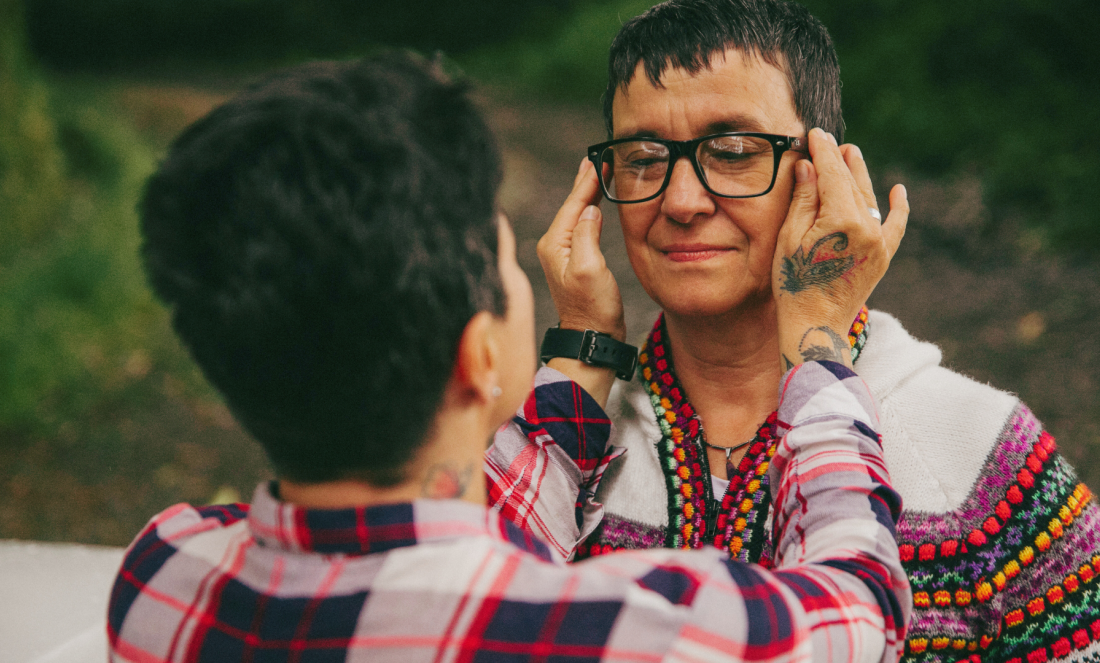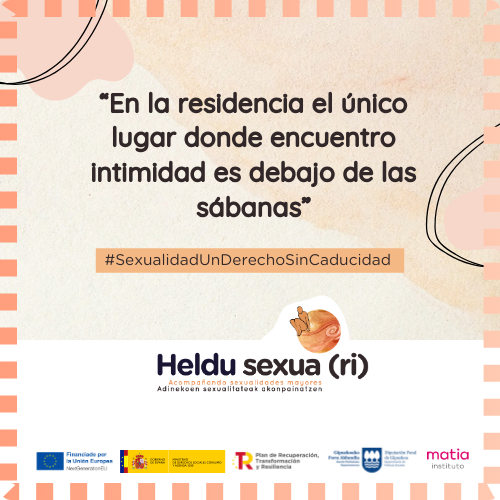
Sexuality in old age. Rescuing it from oblivion, making it a right.
This June 15, international day of awareness of abuse and mistreatment in old age, from Matia Fundazioa we launched the campaign "Sexual rights do not expire", to raise awareness about the violence that we exercise by ignoring or rejecting the sexuality of the elderly.
This campaign is part of the Heldu Sexua-ri project, an initiative that focuses on the lack of support for a vital aspect such as sexuality in care spaces. In this context, the residential centers for the elderly participating in this project identify a common need, which is to create actions that broaden the social imaginary regarding the sexuality of the elderly, not only by combating prejudices, but also by giving sexuality the importance it deserves.
The usual practice in the residential context is to normalize, from the teams, the lack of attention to aspects related to the sexuality of people living in these spaces, because it is considered something frivolous, unimportant and above all with an expiration date. It only seems to gain some prominence when problematic situations arise.
But sexuality is a fundamental part of our lives. Being able to live our sexuality freely, besides being a right and a key aspect of our health, is also the source of many of our well-being and vital pleasures.
However, due to taboo and social prejudice, this dimension of our lives is often ignored and even rejected as we grow older or have support needs. As a consequence, it is common for sexuality to be excluded from most of the analysis, accompaniment and interventions we do in residential centers.
However, in order to advance in Person-Centered Care (PCC) and to accompany people in their chosen lives and meaningful activities and routines, we need to rescue sexuality from oblivion and give it the space it deserves.
To talk about sexuality is to talk about universal human rights.
Sexual and reproductive rights are part of universal human rights based on freedom, dignity, equality and non-discrimination. It should also be added that health is considered a fundamental human right, which implies that sexual health is also a fundamental human right.
And you, dear reader, have you ever stopped to think how many times these rights are violated, and what is the reason? How do you think this social narrative, full of prejudices about the sexuality of these people, influences them? Think that we are talking about elderly people, with support needs... and to this we add other dimensions such as gender, sexual orientation,.... we are faced with an explosive cocktail for discrimination.
So, despite the fact that at first we think that this does not happen, we can find a multitude of examples, identified by the professionals themselves, which show how this violation is part of the day to day of these spaces. Among them:
- Recording as an incidence the finding of a person in his or her room masturbating.
- Offering opportunities in a sexist way to those who live in the center, such as asking men about soccer, and if they would like to go to the hairdresser to women.
- Not carrying out any explicit action to integrate the LGTBAQ+ community, creating heteronormative environments and promoting that people of the collective who go to live in the residences return to the closet.
- Communicate to families the new relationships that are created in the center.
- When detecting the need for support, never incorporate support related to sexuality.
- When faced with ethical dilemmas for professionals linked to sexuality, make drastic and unilateral decisions without deep ethical deliberations.
Do you recognize any of these situations or do other similar situations come to mind? If the answer is yes, this is a great first step to be able to accompany sexuality. Being able to identify this blind spot in our routines contributes to have this aspect more present and to incorporate it, gradually, in our look.
Obviously this is not enough, and as we are finding out at Heldu Sexua(ri), many more things are needed: incorporating sexuality in team meetings, protocols for prevention, detection and action in the face of male violence, training teams, introducing sexuality accompaniment from the first visit to a center, etc.
Campaign materials
We have talked about all these things and many more with experts such as Feliciano Villar and Josep Faba, from the University of Barcelona, and Miren Iturburu, colleague of Matia Institute and member of the ethics committee of Matia, in the first podcast of Heldu Sexua-ri, with an episode linked to this campaign, and in which we talk about the main challenges we face when it comes to include the accompaniment of sexuality of the elderly living in residential settings, as well as key aspects to be able to do so.
In addition, in this campaign we have taken out in social networks the hashtag #SexualityARightWithoutCaducity, along with different images with phrases linked to the subject, to promote awareness. You can download them here.

We invite you to share them in networks, and to add your own reflections and experiences on a subject that we must rescue from oblivion to make it a right.


Add new comment